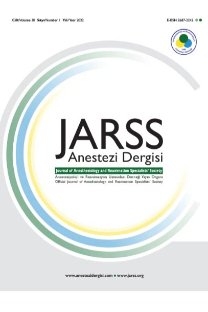Renin anjiyotensin blokajı yapılan hastalarda hangi intravenöz indüksiyon ajanı?
Which intravenous induction agent for patients with renin-angiotensin blockade?
___
- 1.Goodfriend TL, Elliott ME, Catt KJ. Angiotensin receptors and their antagonists. N Engl J Med 1996; 334: 16491654.
- 2.Moser M. Angiotensin-converting enzyme inhibitors, angiotensin II receptor antagonists and calcium channel blocking agents: review of potential benefits and possible adverse reactions. J Am Coll Cardiol 1997; 29: 14141421.
- 3.Oh YJ, Lee JH, Nam SB, Shim JK, Song JH, Kwak YL. Effects of chronic angiotensin II receptor antagonist and angiotensin- converting enzyme inhibitor treatments on neurohormonal levels and haemodynamics during cardiopulmonary bypass. Br J Anaesth 2006; 97: 792-798.
- 4.Behnia R, Molteni A, Igic ́ R. Angiotensin-converting enzyme inhibitors: mechanisms of action and implications in an anesthesia practice. Curr Pharm Des 2003; 9: 763776.
- 5.Schulte E, Ziegler D, Philippi-Höhne C, Kaczmarczyk G, Boemke W. Angiotensin-converting enzyme inhibition and blood pressure response during total intravenous anaesthesia for minor surgery. Acta Anaesthesiol Scand 2011; 55: 435-443.
- 6.Kataja JH, Kaukinen S, Viinamäki OV, Metsä-Ketelä TJ, Vapaatalo H. Hemodynamic and hormonal changes in patients pretreated with captopril for surgery of the abdominalaorta. J Cardiothorac Anesth 1989; 3: 425432.
- 7.Ryckwaert F, Colson P. Hemodynamic effects of anaesthesia in patients with ischemic heart failure chronically treated with angiotensin-converting enzyme inhibitors. Anesth Analg 1997; 84: 945949.
- 8.Licker M, Neidhart P, Lustenberger S, et al. Long-term angiotensin- converting enzyme inhibitor treatment attenuates adrenergic responsiveness without altering hemodynamic control in patients undergoing cardiac surgery. Anesthesiology 1996; 84: 789800.
- 9.Auron M, Harte B, Kumar A, Michota F. Renin-angiotensin system antagonists in the perioperative setting: clinical consequences and recommendations for practice. Postgrad Med J 2011; 87: 472-481.
- 10. Colson P, Ryckwaert F, Coriat P. Renin angiotensin system antagonists and anesthesia. Anesth Analg 1999; 89: 114355.
- 11. Groban L, Butterworth J. Perioperative management of chronic heart failure. Anesth Analg 2006;103: 55-75.
- 12. Reich DL, Hossain S, Krol M, et al. Predictors of hypotension after induction of general anesthesia. Anesth Analg 2005; 101: 622- 628.
- 13. Park KW. Angiotensin-converting enzyme inhibitors, AG receptor blockers, and aldosterone receptor antagonists. Int Anesthesiol Clin 2005; 43: 23-37.
- 14. Coriat P, Richer C, Douraki T, et al. Influence of chronic angiotensin-converting enzyme inhibition on anesthetic induction. Anesthesiology 1994; 81: 239307.
- 15. Brabant SM, Bertrand M, Eyraud D, et al. The hemodynamic effects of anesthetic induction in vascular surgical patients chronically treated with angiotensin II receptor antagonists. Anesth Analg 1999; 88: 1388 1392.
- 16. Bertrand M, Godet G, Meersschaert K, Brun L, Salcedo E, Coriat P. Should the angiotensin II antagonist be discontinued before surgery? Anesth Analg 2001; 92: 2630.
- 17. Rosenman DJ, McDonald FS, Ebbert JO, Erwin PJ, LaBella M, Montori VM. Clinical consequences of withholding versus administering renin-angiotensin-aldosterone system antagonists in the preoperative period. J Hosp Med. 2008; 3: 319-325.
- ISSN: 1300-0578
- Yayın Aralığı: 4
- Başlangıç: 1993
- Yayıncı: Betül Kartal
Alev ŞAYLAN, Özgür CANBAY, Nalan ÇELEBİ, Saadet ÖZGEN
Renin anjiyotensin blokajı yapılan hastalarda hangi intravenöz indüksiyon ajanı?
Reyhan ŞAHİN, MEHMET İLKE BÜGET, AHMET KEMALETTİN KOLTKA, Zerrin ÜLKE SUNGUR, TÜLAY ÖZKAN SEYHAN, Ayşe YAVRU, Emre ÇAMCI
Obez gebelerde anestezi yönetimi ile ilgili derleme üzerine:
Nevriye SALMAN, Ahmet Barış DURUKAN, Hasan Alper GÜRBÜZ, Halil İbrahim UÇAR, Cem YORGANCIOĞLU
Anesteziyoloji ve dahiliye asistanlarındaki iş stresi ve tükenmişlik durumu
Şennur UZUN, Bilge KARACAOĞLU, Seda Banu AKINCI, İ. Aydın ERDEN, Fatma SARICAOĞLU, Ülkü AYPAR
ÖZLEM SAĞIR, Ayşe Neslihan BALKAYA, Sabri ÖZASLAN, İsmail ARSLAN, Yücel MERİÇ, Ahmet KÖROĞLU, Ümit İNCEBOZ
Talyum sintigrafisi sonrası hipokalemiye bağlı ventriküler fibrilasyon gelişen bir olgu
NEZİH SERTÖZ, Esin BAŞ, Asuman SARGIN, Semra KARAMAN
Porfirili bir gebede sezaryen operasyonunda Epidural anestezi
İsmet TOPÇU, Canan UYSAL, Tülün ÖZTÜRK
Osman KARAKUŞ, Faik Emre ÜSTÜN, CENGİZ KAYA, ELİF BENGİ ŞENER, Fatih ÖZKAN, ERSİN KÖKSAL, YASEMİN BURCU ÜSTÜN
